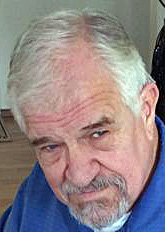 A five-year-old boy is sitting in the middle of the kitchen eating raw oatmeal. The kitchen is one of the two rooms in the tiny house. When his family had moved in, there was only one room, but his father built a cardboard partition to make a distinction between the kitchen and the bedroom. Five people sleep in this bedroom.
A five-year-old boy is sitting in the middle of the kitchen eating raw oatmeal. The kitchen is one of the two rooms in the tiny house. When his family had moved in, there was only one room, but his father built a cardboard partition to make a distinction between the kitchen and the bedroom. Five people sleep in this bedroom.
The house has no indoor plumbing. Water is drawn from a well outside and kept in a bucket in the corner of the kitchen. Other toilet functions are accomplished in an outhouse 150 feet behind the house.
Cooking is done on a portable kerosene stove. A tin wood-burning stove provides heat in the icy winter, but not much, for there is no insulation in the walls: there is not even an inner wall. If the stove gets too hot, it will melt, but there’s not much danger of that. It’s too small to hold much wood.
The boy and his two younger sisters are alone in the house, because his father is working in a garage and his mother has been called next door to help a neighbor woman who has just given birth to twins. The twins are sick, and one of them will die next month.
The boy is eating raw oatmeal because it’s the only thing he can reach, and he doesn’t know how to cook it. When his mother comes home, she’ll prepare something more nourishing, probably chicken and gravy, potatoes and sourdock she has gathered from a vacant lot nearby.
She tries hard to keep her family fed with the meager income her husband earns. In fact, they never go hungry, though often they live on what they call vitamin B-3: beans, biscuits and blackberries. She has graduated from high school and knows what a family needs to stay healthy.
She wants her children to be better educated than their parents. Already she has written the letters of the alphabet in a straight line at the boy’s eye level, and he has memorized all the letters.
He has even learned to print his name, and he has done so, right under the line of the alphabet: Danny Bosserman, March 13, 1947. If he knew how, he would include the place he lives: West Plains, Missouri.
In 1959, the boy graduates from Oregon City High School. Now he lives in a farm house with running water and a television, though cooking and heating are still done on wood-burning stoves. The diet is more varied, though most of what they eat is grown on the farm. The boy can reach and cook anything he wants, but he’s still partial to oatmeal.
In the fall he will go away to college, and then will serve in the U.S. Navy. He will read about Lyndon Johnson’s Great Society, and will finally realize what he never knew while he was growing up: his family had narrowly escaped being casualties in the War on Poverty.
He grew up believing he was part of the Great American Middle Class, that Ward and June Cleaver were fabulously wealthy, that only rich folks could afford decent medical care, and he felt sorry for all those people in other countries who lived in poverty.
In 2019 he owns a house on an acre of ground in Boring, Oregon, with indoor plumbing, gas heat, a microwave, cable TV, a Ford Expedition SUV, and three computers. Between them, he and his wife work four jobs to supplement Social Security and a small pension.
He writes a column in a monthly newspaper, and tries to figure out how it is that his government pays farmers not to grow wheat on the most fertile land in the world, while subsidizing others to grow tobacco, and conducts global studies concerning the problem of hunger in third-world countries.
He still has a weakness for oatmeal on a cold winter’s morning, but nowadays he puts a little butter and maple syrup on it.
No Comments
Leave a comment Cancel